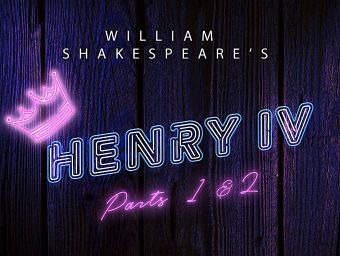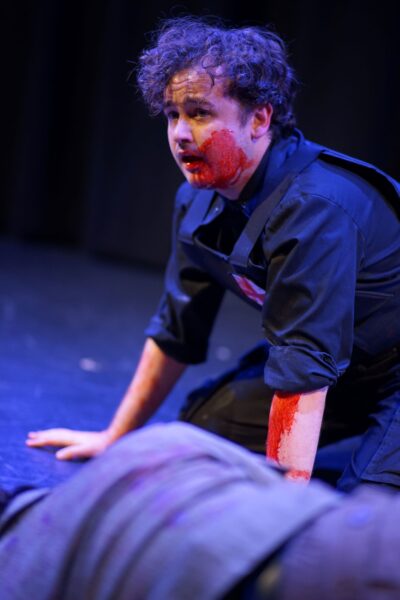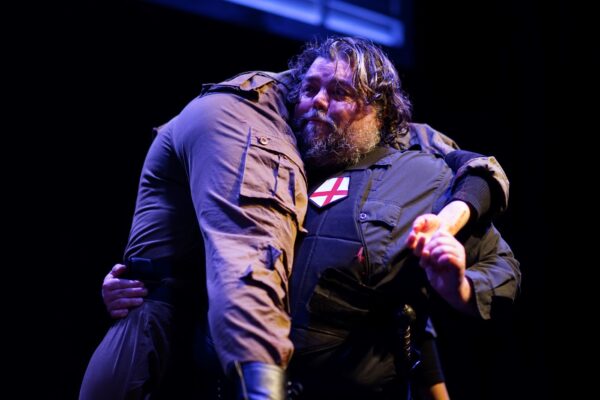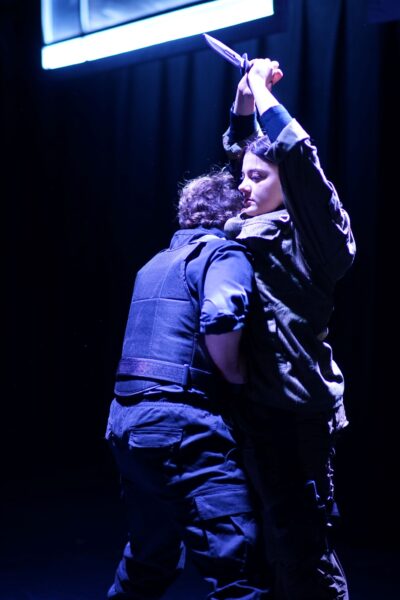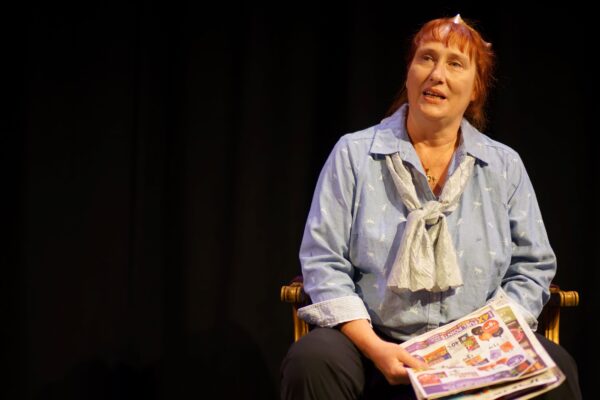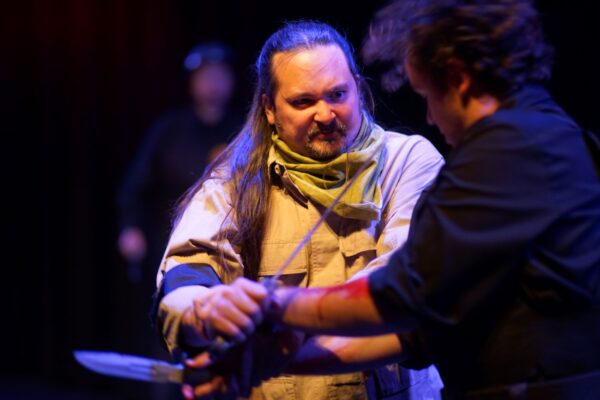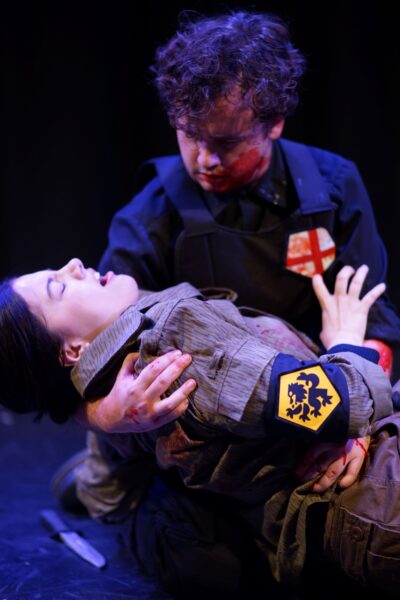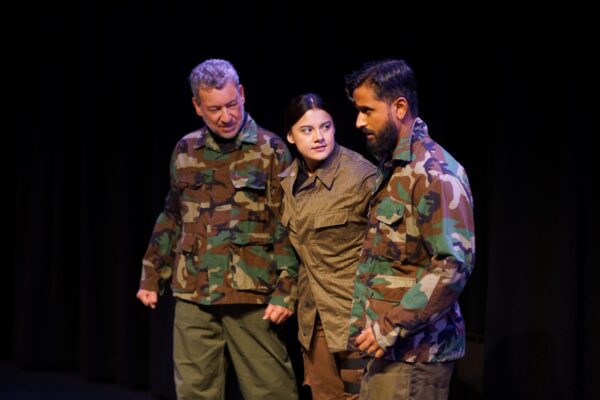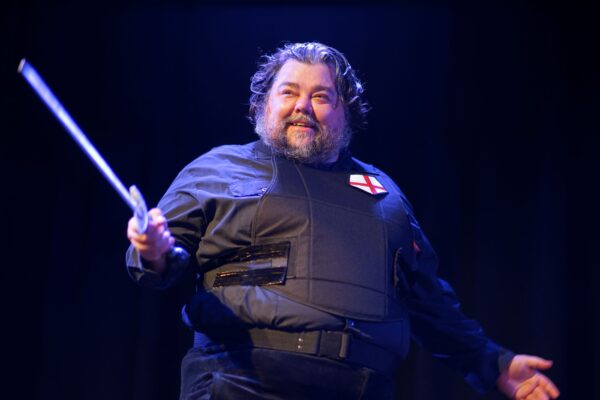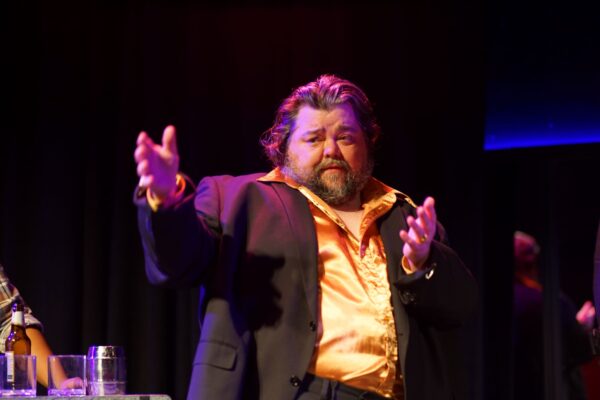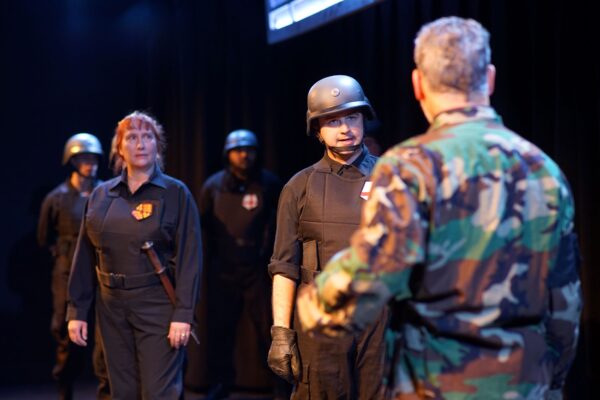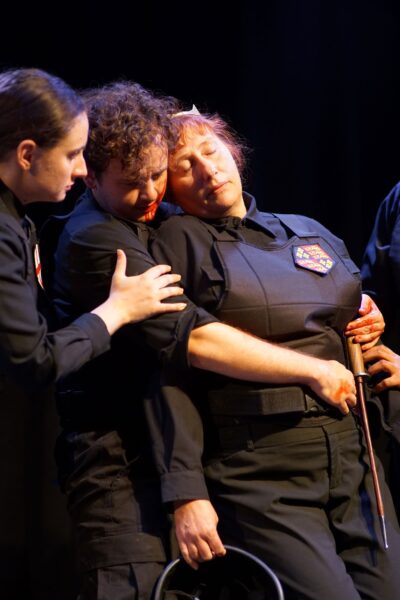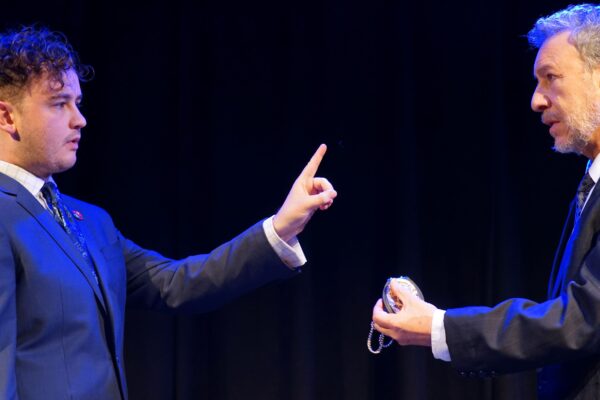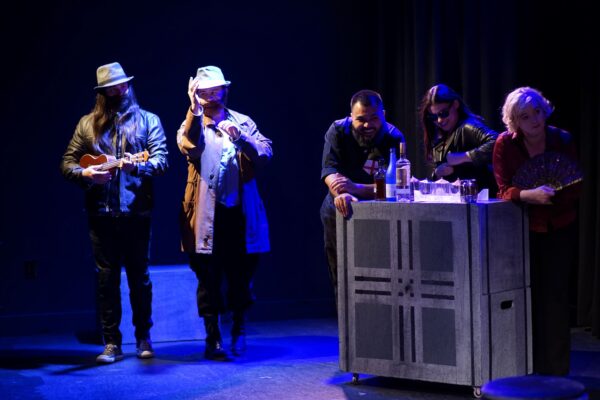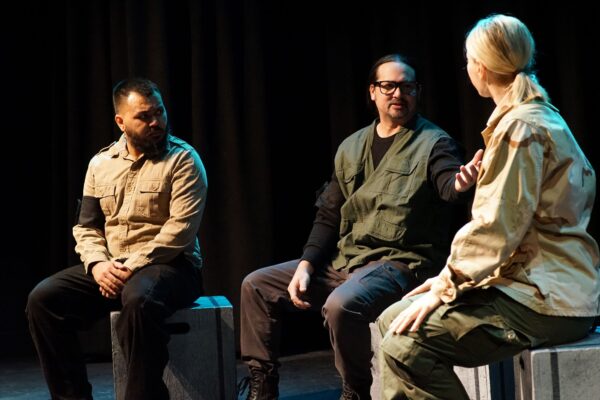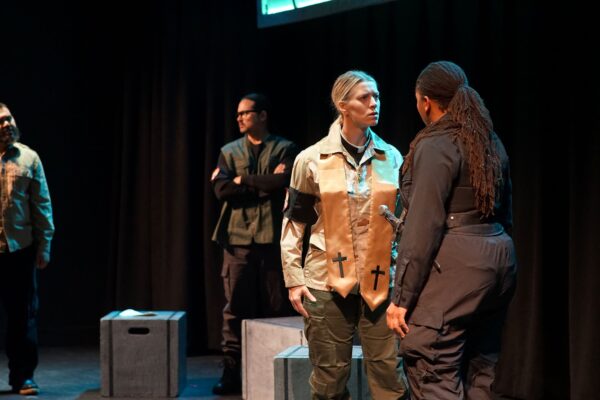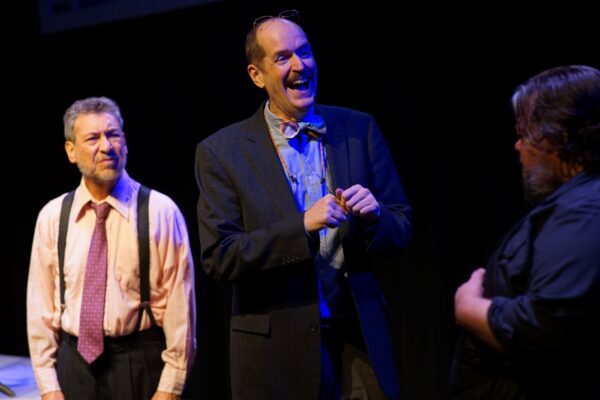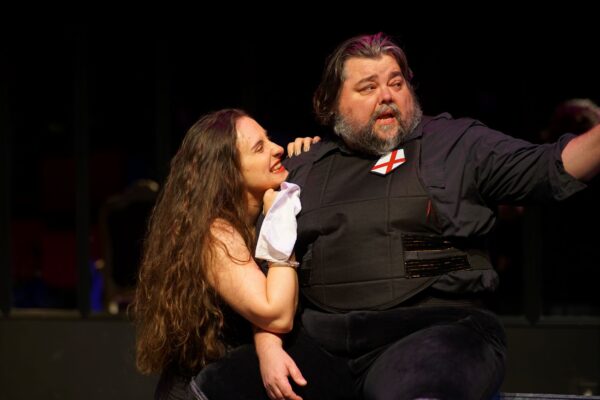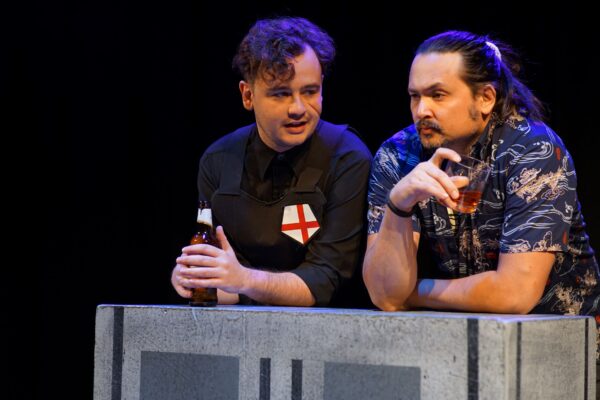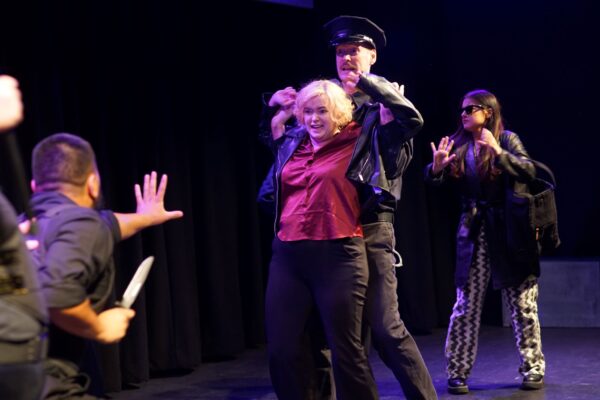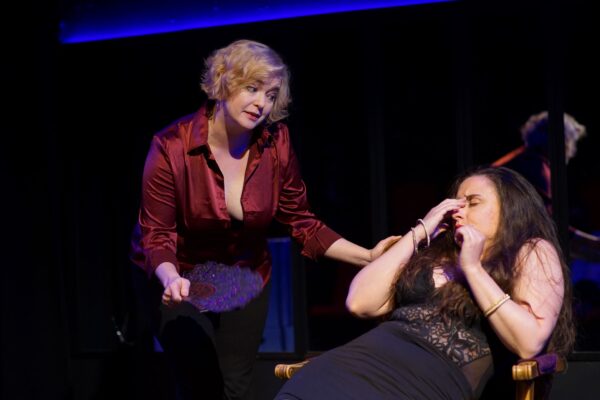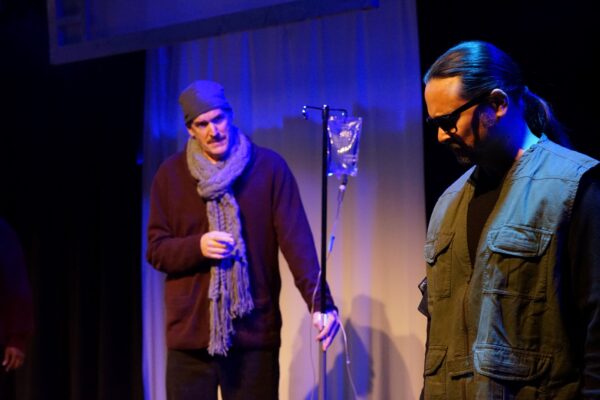THE PORTERS SHARE WITH US IN GLORY HENRY IV
There is a danger of critical indulgence when considering a company like the Porters of Hellsgate; their ambition to produce all of Shakespeare’s canon (which they’ve nearly accomplished – four plays remain) is laudable and exceptional, such that there is a temptation to simply approve each production not as a standalone production, but as a necessarily praise-worthy extension of their broader agenda.
Happily, there is no danger of such indulgence here, as the Porters’ most recent venture, Henry IV Parts 1 and 2, which closed Sunday after a short run (November 10-24), is mostly a successful achievement. I saw the second to last performance of Part 1, and then the next night, the final performance of Part 2.
Although Part 1, from Shakespeare’s day till now, remains one of his most enduring, popular and adaptable plays, the Porters remind us that the less frequently played Part 2 is really the source of some of the most iconic moments and lines in the Hal and Falstaff mythology. It is in Part 2 that the Prince becomes King, and then banishes his former surrogate father/companion/soulmate, a scene in which Will Block and Thomas Bigley, Hal and Falstaff respectively, do some of their best acting.
As showtime nears for both parts, a screen onstage plays footage from a period described in the playbill as “Today in an alternative universe, England”: Paramilitary groups stalk with assault rifles as text reads, “Bolingbroke seizes crown”; scenes of Hal and Falstaff partying in Eastcheap with tabloid front pages promising details of the Prince’s party boy lifestyle; and mug shots of the Prince after a wild night out.
Director Margaret Starbuck, whose other Shakespeare credits include Richard II and Measure for Measure (Method & Madness Theatre Co.), supplies a quirky, un-tediously experimental rendering of Henry IV‘s world. There is always the directorial danger of overwhelming Shakespeare’s text, which is often perfect, with interpretations, which are often imperfect.
Starbuck dodges such danger with sparely imaginative decisions; characters wear sneakers, use modern props (and occasionally idioms), and none of it is ever distracting or annoying. Then there are those bits of costume which echo medieval-crusader times and England, the original world of the play. And though some might flag these choices for inconsistency or vagueness, I argue they play a simplifying role, closing the gap between the audience and the language of the Bard.
Starbuck also gets credit for disruptive casting choices; King Henry is played by Dawn Alden, and Hotspur by Blanca Isabella. This conversion of gender is interesting, because Henry IV Parts 1 and 2 are frequently read as dramas about fathers and sons, but endless possibilities become available in the gender switch. Helpfully, both performers are superb. Some of the best moments in Part 1 are carried by Isabella’s emphatic, committed portrayal of Hotspur, which reached an astonishing height in her death scene in climactic battle with Hal, in which she gasped out her last words in a gorgeously extended, almost unbearable monologue.
Alden gleams as the King, bringing pathos and instability to her waning royalty, and to the relationship to her son which has been warped by power contentions in and outside the kingdom. The lean efficacy of the stage design is apparent in those scenes at court, where Alden wears a slender, cheap-looking gold crown, and sits on a chair with a cushion. This production neatly conveys distinct worlds as the set slides from the Court, to London, to riotous Eastcheap, announcing location changes with quick text on a screen like captions in a movie.
Will Block, who has served as POH’s Artistic Director since 2022, is a volatile, nerve-frayed Prince Hal. He uses a barely contained explosiveness to convey the character’s mixture of certainty and terror as he comes to terms with the responsibility of the kingdom. Though in his first soliloquy the Prince seeks to portray himself as manipulating the world around him, Block’s stuttering and angry conniving embodies the shaky vision of this character, as well as the hopelessness of his quest for self-mastery and fulfillment.
Much of the savoring of Henry IV depends on a compelling Falstaff; the Porters do not fail in this. Not only is Thomas Bigley a picturesque Sir John, he is a subtly effective one, turning the darker corners of this character. He is superb in those moments where Hal’s capacity for violence and inhumanity erupts, and Falstaff sees his true subject-position in relation to the imminent King, unnatural systems of state warping their former bond. Falstaff is nothing before the new King Henry, and his world is foreclosed by Hal’s ascent.
An inventive and arresting touch comes at the end of Part 1; a drop of blood falls from the back of King Henry’s head, signifying the infirmities which will lead to her son’s accession to the throne.
In Part 2, the doubling and tripling up of roles is used to great effect. Howard Leder, who also plays Glendower, is a cloying and dainty Justice Shallow. His scenes with Cousin Silence, rendered as a preposterous nub of a man by Dennis Gersten (effective also as Worcester and the Lord Chief Justice), are absolutely deliciously hysterical.
On a different note, in both parts of Henry IV, the production handles scenes of military strategizing and state machinations with dexterity and clarity. These are necessary parts of the play’s machinery, and are successfully milked for their humor, and for Shakespeare’s distinct characterization of even minor personages.
Other highlights of Part 2 include the last conversation between the King and Hal, when the Prince takes the crown from the sleeping King’s pillow. Here are some of Alden and Block’s finest moments; Block tones down some of his edgy, lippy acting, and Alden, consistently effective as the King, is here truly possessed by Shakespeare’s vivid language in these languishing moments, which function as a death scene – we never see her again.
The new King’s coronation and final denial of Falstaff’s friendship are executed perfectly. Bigley as Falstaff silently inhabits all the pain of his banishment, and Block’s physicality, gently and briefly stroking Falstaff’s hand before turning him away, is delicate and meaningful.
I was inclined to criticize Part 2 for an overreliance on antics, but as the friend who accompanied me pointed out, this excess is necessary, as Falstaff himself has become repetitive, tiresome and redundant to the changing world of the play, culminating in his banishment by Hal.
There was a looseness to the cast the closing night of the run. I could feel all the giddiness and complexity of a show coming to an end. The little house that is the Madnani Theater was full, and moments of humorous interchange between performers and audience punctuated what is, in the case of Part 2, a grim, elegiac play about how human creations like kingdoms warp the humans who created them out of all recognition; the King’s Body as concept kills the actual human body of the king, and destroys the bond between parent and child. It is evidence of the Porters’ success this time around that they amplify all that is meaningful about Henry IV Parts 1 and 2.
Jen Albert, the fight choreographer, deserves special mention for orchestrating dynamic and impactful battle scenes, replete with swords clanking and actors hurling themselves into the fray with total commitment.
The Porters of Hellsgate remain well-equipped for their quest to perform their way through Shakespeare’s canon. Among the remaining plays is A Midsummer Night’s Dream. This is one of Shakespeare’s supreme delights, and if all’s well that ends well, the Porters are in a position to give this city more nights of unforgettable magic.
photos by Lucia Ledoux
Henry IV Parts 1 and 2
The Porters of Hellsgate
The Madnani Theater, 6760 Lexington Ave
played November 10-24, 2024
for future shows, visit Porters of Hellsgate
